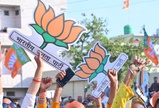Ahmedabad: The latest trends coming out of the Election Commission on Saturday show the BJP maintaining its dominance in Gujarat, securing leads in 25 out of the 26 Lok Sabha seats in the state with the Congress ahead in the remaining one seat.
The Congress made notable gains in Banaskantha, where its candidate Geniben Thakor is leading by over 10,000 votes against the BJP’s Rekhaben Chaudhari.
This shift indicates a partial recovery for the Congress in a region where it has historically been competitive.
The BJP’s tactical approach in selecting candidates and campaigning aggressively in key regions paid off, with Home Minister Amit Shah securing a substantial victory in Gandhinagar with 694,955 votes, outstripping his closest rival INC’s Sonal Patel by a margin of 544,617 votes. Similarly, Poonam Madam in Jamnagar and Union Minister Purshottam Rupala in Rajkot are likely to win with leads, showcasing the BJP’s stronghold over urban and semi-urban areas. Additionally, the party’s strategic focus on the tribal belt, a traditionally less favorable region, further consolidated its electoral base.
The 2024 elections also highlighted a unique scenario in Surat, where the BJP candidate Mukesh Dalal was elected unopposed after the Congress candidate’s nomination was rejected, and the other contenders withdrew.
Despite the overwhelming wave in favor of the BJP, the INC’s ability to lead in Patan and Banaskantha is significant. Patan, a constituency with a historical tilt towards the BJP, witnessed a surprising turnaround with Chandan Thakor leading. This change is particularly striking when compared to the 2019 results where Bharatsinhji Dabhi of the BJP won with a huge majority. Similarly, Geniben Thakor’s performance in Banaskantha showcases the INC’s resilience and suggests a potential recalibration of voter preferences in these regions.
The history of electoral outcomes in Gujarat has predominantly favoured the BJP, especially under the leadership of PM Narendra Modi. Since his ascendance as Prime Minister, the BJP has capitalized on his popularity and the party’s development narrative to secure overwhelming victories in 2014 and 2019, achieving a clean sweep of all 26 seats in both elections.
The Congress party’s struggles in Gujarat stem from several structural and strategic deficiencies. A lack of strong local leadership and an ineffective counter-narrative to the BJP’s governance model have often put it on the back foot. The electoral outcomes in 2014 and 2019 were reflective of these challenges, where the party failed to secure any seats. However, the gains in 2024 suggest a possible shift in strategy or voter sentiment that could pave the way for a more competitive political environment in future elections.
–IANS


Comments are closed.